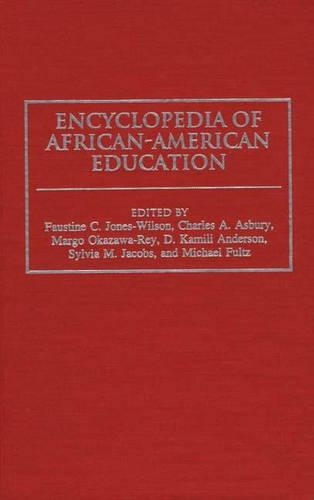
Encyclopedia of African-American Education
(Hardback)
Publishing Details
Encyclopedia of African-American Education
By (Author) Charles A. Asbury
By (author) D. Kamili Anderson
By (author) Michael Fultz
By (author) Sylvia M. Jacobs
By (author) Faustine C. Jones-Wilson
By (author) Margo Okazawa-Rey
Bloomsbury Publishing PLC
Greenwood Press
28th August 1996
United States
Classifications
Tertiary Education
Non Fiction
Ethnic studies
Reference works
371.82996073
Physical Properties
Hardback
584
Description
This indispensable reference is a comprehensive guide to significant issues, policies, historical events, laws, theories, and persons related to the education of African-Americans in the United States. Through several hundred alphabetically arranged entries, the volume chronicles the history of African-American education from the systematic, long-term denial of schooling to blacks before the Civil War, to the establishment of the Freedmen's Bureau and the era of Reconstruction, to Brown v. Board of Education and the civil rights reforms of the last few decades. Entries are written by expert contributors and contain valuable bibliographies, while a selected bibliography of general sources concludes the volume. The African-American population is unique in that its educational history includes as law and public policy the systematic, long-term denial of the acquisition of knowledge. In the 18th century, African-Americans were initially legally forbidden to be taught academic subjects in the South, where most African-Americans lived. This period, which ended around 1865 with the conclusion of the Civil War and the establishment of the Freedmen's Bureau, was followed by the introduction of laws, policies, and practices providing for rudimentary education for 69 years under the dual-school, separate-but-equal policies established by Plessy v. Ferguson (1896). These policies did not end until the Brown v. Board of Education decisions of 1954 and 1955 were reinforced by the passage of civil rights and equal opportunity legislation in the mid-1960s. The education of African-Americans has been a continuing moral, political, legal, economic, and psychological issue throughout this country's history. It continues to consume time and attention, and it remains an unresolved dilemma for the nation. Through several hundred alphabetically arranged entries, this indispensable reference offers a comprehensive overview of significant issues, policies, historical events, laws, persons, and theories related to African-American education from the early years of this country to the present day. The entries are written by expert contributors, and each entry includes a bibliography of works for further reading. A selected, general bibliography concludes the volume.
Reviews
Appropriate education for African Americans is a long-standing issue with far-reaching implications for all aspects of life in the US. This book is a comprehensive reference source for readers interested in the events, people, and institutions that have formed the basis for the education of African Americans....A good overview of Greek-letter organizations supplies information sometimes difficult to locate. More than 200 contributors provide clear, succinct articles one or two pages in length, which are arranged alphabetically and end with brief bibliographies. Highly recommended for all levels of readers.-Choice
This specialized encyclopedia covers significant issues, policies, historical events, laws, theories, organization, institutions, and people in African American education....Libraries with extensive collections in education or African American studies should consider this for purchase...-Booklist/Reference Books Bulletin
"This specialized encyclopedia covers significant issues, policies, historical events, laws, theories, organization, institutions, and people in African American education....Libraries with extensive collections in education or African American studies should consider this for purchase..."-Booklist/Reference Books Bulletin
"Appropriate education for African Americans is a long-standing issue with far-reaching implications for all aspects of life in the US. This book is a comprehensive reference source for readers interested in the events, people, and institutions that have formed the basis for the education of African Americans....A good overview of Greek-letter organizations supplies information sometimes difficult to locate. More than 200 contributors provide clear, succinct articles one or two pages in length, which are arranged alphabetically and end with brief bibliographies. Highly recommended for all levels of readers."-Choice
Author Bio
FAUSTINE C. JONES-WILSON is Professor Emerita of Education at Howard University and Editor Emerita of the Journal of Negro Education. Her books include The Changing Mood in America: Eroding Commitment (1977) and A Traditional Model of Excellence: Dunbar High School of Little Rock, Arkansas (1981). She is also the author of numerous articles, book chapters, editorials, and book reviews. CHARLES A. ASBURY is Professor Emeritus of Education at Howard University. His articles have appeared in journals such as Negro Educational Review, the Journal of Research and Development in Education, the Journal of Negro Education, and the Review of Educational Research. MARGO OKAZAWA-REY is Professor in the School of Social Work at San Francisco State University. She has worked with school and community organizations in the development of strategies that promote multicultural awareness and empowerment for communities of color. She is the author of several articles and book chapters, and is a coeditor of the forthcoming book, Roots of Racism/Stories of Resistance: Critical Perspectives on Multicultural Education. D. KAMILI ANDERSON is Associate Editor of the Journal of Negro Education. Her publication credits include the Literature chapter in Black Arts Annual: 1987-1988 (1989) and numerous book reviews, news and feature articles in Black Issues in Higher Education, Belles Lettres, New Directions for Women, Conditions, the Journal of Negro Education, Sage and Small Press. SYLVIA M. JACOBS is Professor and Chair of the Department of History and Social Science at North Carolina Central University. Her previous books include The African Nexus: Black American Perspectives on the European Partitioning of Africa, 1889-1920 (1981), and Black Americans and the Missionary Movement in Africa (1982), both published by Greenwood Press. MICHAEL FULTZ is Associate Professor of Education at the University of Wisconsin, Madison, where he specializes in the history of African-American education. His writing has appeared in such publications as the Teachers College Record, the Harvard Educational Review, and the Journal of Negro Education. Professor at the Harvard Graduate School of Education.
